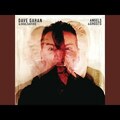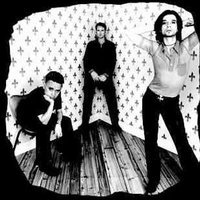There’s a deep vein of self-reflection running through Dave Gahan’s latest project that sets it apart from his iconic discography with Depeche Mode and solo work. A second collaborative LP with English producers Soulsavers, Angels & Ghosts finds the 53-year-old opening up like never before. “This album is a bit self-confessional,” he admits. “It reflects the way I see myself, the way I see those around me and the way that I see myself in the world.”
“[It’s] uncomfortably true to where I am,” the electro-pop pioneer concludes. “There’s nothing to hide behind.” That brutal honesty was also on display when I caught up with Dave in Los Angeles earlier this month. He spoke openly about the evolution of the album, mellowing with age (“we get to a place where we’re so old and rickety that we can’t do any more to damage to ourselves”) and his recollection of Depeche Mode’s 1990 Los Angeles record store riot. Find out more below.
Why did you decide to record a second Soulsavers album instead of the third solo LP?
It became a bit of both of those things. Rich Machin who I write with, and who is really Soulsavers with his pal Ian Glover, we talked about that when we were writing together. He was like, “this should be a Dave Gahan solo record.” That never even crossed my mind, because to me it was a collaborative work. There’s a deep yearning in me to actually communicate with somebody else. That really happened for me the most with Rich and Soulsavers. It’s not something we’re clambering to try and achieve. It just happens. It’s unique like that.
Quite often you want to collaborate with people. You think it’s a good idea. Something’s put in front of you. You sit down and you talk about it, or you start to try and work on something, and you realize very quickly it’s not working. That’s not necessarily because they’re not great artistes, but we’re just people and it’s not working.
Do you put that down to different perspectives or simple chemistry?
Both. Rich and I are like-minded souls in some ways. I’ve only learned this over the couple of records that we’ve worked on together, but definitely he has a tendency to gravitate towards the darker side. To use that, and to try and work out of it. I found that with music, it’s how I survive — through writing and melodies and words. Sometimes mine, sometimes somebody else’s.
Some key songs on the albums that I made with Martin Gore, it’s crazy how he’ll give me a lyric or a melody that blows me away. It even happened a couple of times on the last one Delta Machine, on “Heaven” and “Angel.” There are opposite feelings to those songs, but they both have this beautiful light and this dark side that sometimes that comes together. It crashes together in this crazy way. All of a sudden, something really beautiful and creative comes out of something quite destructive. For me, it’s often the case.
Is there less pressure with a collaborative album than a solo project?
Yes. We ended up calling this one Dave Gahan and Soulsavers. One, because we felt that more people might listen to it with my name on it. That was an obvious thing to do, but there was a point where Rich was like, “Do you think this should just be a Dave Gahan record?” He just wants more people to hear the music too. Whatever it takes to do that, but it is definitely more of a collaboration for me. Soulsavers is a production team, so it makes more sense.
In an interview you said that sometimes you only understand a song after it’s written. Have you got enough distance from Angels & Ghosts to make sense of it yet?
Yeah. I surprised myself, to be honest. I went pretty deep with this. At the time, it wasn’t something that I did on purpose. Instead of trying to edit it, I let it happen. Afterwards, I realized this album is a bit self-confessional. It reflects the way I see myself, the way I see those around me and the way that I see myself in the world. What I would like it to be, what it’s not. I would like to be a kinder, more giving person, but for some reason, it’s really hard for me.
On one of the songs, I talk about loving somebody, but not being able to tell them. I say, “You know I love you more than life itself. I just can’t tell you why.” That really describes me in some ways. It’s a fear of having something and then losing it, or not really understanding why you have it or why it’s been given to you. I really try to not edit that stuff. When I’m talking about it right now, I feel like, “Oh God, it sounds so corny.” But it’s the truth, and it’s the truth from deep in my soul, because it comes out in music.
There’s a song called “One Thing” on the album, which again ends up being about love. Knowing that I have it around me, but just not being able to feel it — not because it’s not being given to me, but because I just can’t go there. Which is a horrible way to feel a lot of the time, but it is what it is. I used a few different metaphors on that song. For instance, “There’s always life on Mars out there for me,” which references David Bowie.
“Life On Mars” is a song about alienation, but it’s so beautiful. It’s a song that I can play on any given day, no matter how I’m feeling, and it will change the way I feel in that moment. I love those quick fixes. Some of them are more helpful than others, and last longer. That one certainly has lasted for pretty much all my lifetime, from when I first heard it as a 13-year-old kid, watching a TV show and seeing this strange man singing these words that made sense to me. Sorry, I lost my train of thought.
No, that’s perfect and takes me to my next question. “All of This and Nothing” strikes me as the kind of song that could only come from someone who has been through a lot…
Or someone with a deep hatred for themselves. It’s also about what I put other people through and seeing the destruction that I caused. At the same time, there’s this belief that there’s so much more and I’m a part of it. Sometimes I can feel this over-exaggerated sense of responsibility, and other times I’m literally the dirt under your feet, that’s where I’m real comfortable. It’s like that’s where I deserve to be. That song is probably one of the most obvious lyrically in that it blatantly shows these sections of this weird split personality. The feeling of having so much empathy and then nothing.
I’ve always been a bit extreme like that. It’s definitely mellowed out a bit with time, thank God. I get periods, chunks of time where I can tread water for a while and it feels pretty good, watching the TV or whatever. Then there are times when it’s just unbearable. Then other times when I could be sitting next to my daughter or at the movies with my wife, just in the moment and everything is just fine and simple, and not complicated. It is me, I know that, I do know that.
That comes with age. As you get a little older, you start to realize no one’s doing anything to you. I make my own choices. I would like to be kinder and more giving, and all those things. Sometimes I just can’t get there, and that frustrates me, and thank God I can put it into some form of art, so hopefully at least there’s some outlet, certainly for me, but also for others I know that feel just like me.
Can that self-awareness become crippling?
Yes, if see the humor in it. Without that, it really would be ridiculous. In the Western world, we have it great. It’s not good enough though, it’s still not good enough. That really disappoints me, and makes me disappointed in myself, that it’s never good enough. I do believe that this album has come right when it’s supposed to come. That’s not to say other projects I’ve worked on haven’t been important, but this a key anchor moment.
There have been these big anchors, but this album for me now, having finished it and it being here, is almost uncomfortably true to where I am. There’s nothing to hide behind, because I’ve put my name in front of it. Being in a band, I would say, it was the greatest thing for me — and still is — because it’s somewhere I get to be part of something and live vicariously through this great facade.
I’m really clear on that now and I’m actually also really grateful for it, because it saved my life time and time again. Also, I feel that the music, and people that listen to it, and feel something from it, is a great gift to have had. I’m really aware of that, because without it, I don’t know what I would have been doing. I certainly, at the beginning of my career, wouldn’t have been capable of making a record like this.
I felt those moments definitely with Depeche Mode as well. There have been these moments where we were just right where we were supposed to be, for better or worse. That happens to everybody in life at a certain point. You get to see yourself repeating the same things over until we get to a place where we’re so old and rickety that we can’t do any more to damage to ourselves, we just have to deal with it. Maybe that’s why life isn’t in reverse. Our void would be terrible, wouldn’t it? We get so frail that we can’t do any more damage.
I was surprised by the acoustic elements on this record. What that a conscious decision?
It was definitely a decision to not over-produce it. We wanted to keep it as raw as possible, as minimal as possible. When it needs to be in your face, let it be, and when it’s not, leave that space. Just leave it alone, don’t fill it up with a little noise just because there’s a hole there. You can’t take all the work you’ve done, then put it on the grid in the computer on Pro Tools and go, “The drum pattern’s a little out of time in that frame. Let’s just repeat this and chuck it over here.” That doesn’t work with this project.
I read that “Shine” was inspired by being on stage with Depeche Mode.
Yes. We were in this huge stadium in the middle of Berlin, like 60,000 to 70,000 people and it was just an amazing night. I couldn’t of wished for more. There’s a light when you have a perfect moment and it shines on you and I saw it in everybody. Quite a bit later, Rick sent me this slide guitar part that was very distorted and it was just simple guitar, one big beat. That’s all it was, but I remembered that feeling and wrote lyrics in about 20 minutes.
That song was there, so I sang it into my phone with this slide guitar part and I quickly emailed it back to Rick and said, “Look, I know I don’t normally do this and it’s live, I just sang it in my bathroom but what do you think?”
Were the acoustics good in there?
It was really good acoustics and it sounded okay! I did check it, I checked it before I sent it. I think he just immediately emailed me back, he was kind of like, “Wow.” It came together really fast. I thought about putting on Depeche Mode’s last album. We’d started working on “Heaven” and “Angel” and it wouldn’t have been out of character on Delta Machine. There was another part of me that was like, “No. This is something that I’ve done with Rich.” I felt like I was cheating on him, or something.”
There was something not right about it, so I just tucked it away. Some part of me knew that it was going to be used. It’s the first song on the album. It sets up this feeling of hopefulness and optimism, and then it all kind of comes crashing down. What I call the end of the first side of the album is really “All Of This And Nothing.” The second side begins with “One Thing,” ending with “My Sun.” It certainly goes around all the emotions.
You’re starting with a limited run of intimate shows. Will you be touring this album at bigger venues?
It’s not something we’re ruling out at the moment, but there are no plans to do it. Honestly, I wasn’t sure I wanted to do any performances at first. Once we started writing together, I really felt like we had enough of a body of work, including the record before, that this could really be a performance now. Once that opportunity became real, I sort of jumped at the chance.
It’s difficult to get everybody together. Sure, we could go out and play the songs and I could sing, and Rich could play, and we could put together some sort of pick-up band or whatever. I have to wait and see, really. I know it’s just a few performances, but in the same way that we work together and we write these songs together now with technology, one good thing about it is that lots of people are going to get to see and hear this. I know it’s not the same as actually being there, but through the help of the internet, we’ll get it out there, hopefully.
I recently saw footage of the Depeche Mode record store riot of 1990. What do you remember about it?
It was out of control. I mean I think there were 10,000 people on the streets. That night we went back to our hotel and our American manager at the time was so excited. He flipped through every TV channel and they were all talking about was “English rock band Depeche Mode.” All these weird newscast guys talking about us, just hearing the word Depeche Mode coming out of their mouth was enough to get us really excited. It felt so wrong.
I remember us jumping out of that car and running into the warehouse and then within forty five minutes the police being there. An officer came in and said: “You’ve got to shut this down now.” We were like “What do you mean shut it down?” We’re just signing records. Then when we went back out on the street, all hell was breaking loose. It was pretty amazing moment. We ruined Los Angeles for one night. Oh, boy that was fun.






